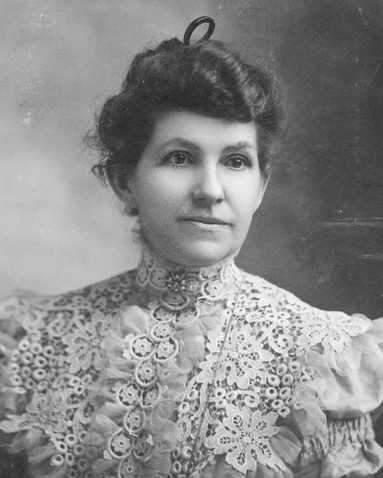Lilla Day Monroe - Lawyer, Suffragist, and Pioneer
Born: November 11, 1858, Indiana, U.S.A.
Died: March 2, 1929, Topeka, Kansas, U.S.A.
Lilla Day Monroe was an American lawyer, suffragist, and pioneer whose work shaped both Kansas history and women’s rights across the nation.
Lilla was born Lilla Day Moore on November 11, 1858, in Mooresburg, Indiana, a town named after her father, Ephraim Riley Moore. Her mother, Rachel Ann Murphey Moore, taught her both traditional homemaking skills and the importance of reading. Lilla, her mother, and her brothers often walked miles to the local library to borrow books, which the family read and discussed together.
As a girl, Lilla credited her brothers for making her “a good sport.” By age fifteen, she had already finished Normal School and began teaching, which was her first job.
Lilla began studying law under Judge Slack in Indiana, and when she moved to WaKeeney, Kansas, in 1884, she continued her legal studies. There she met and married Lee Monroe, a young attorney from Pennsylvania. They had four children, and Lilla balanced family life with her interest in law.
She worked as a clerk in her husband’s office and studied with him at home. In 1894, she passed the bar exam and was admitted to practice in District Court. On May 7, 1895, she made history as the first woman admitted to argue before the Kansas Supreme Court.
Although she stopped private practice when her husband became a judge, Lilla continued using her legal skills to volunteer, write, and fight for reform.
Lilla Monroe quickly became one of Kansas’s leading voices for women’s suffrage. In her speeches, she explained why women needed the vote, often pointing to unfair liquor laws as an example of why women deserved a say in government.
After moving to Topeka in 1901, her home became a meeting place for activists. She served as president of the Kansas Equal Suffrage Association and later as Kansas chair of the National Woman’s Party. Between 1908 and 1912, she worked tirelessly to convince lawmakers to support women’s suffrage and gave speeches across the state.
She even wrote a playful book called The Gee-Gee’s Mother Goose filled with rhymes, which she used to calm heated debates about women’s rights.
Although deeply committed, Monroe resigned from her leadership position when she felt the national suffrage movement was becoming too political. She believed the cause should remain focused on voting rights, not party politics.
In 1919, Monroe was elected the first president of the Kansas Women Lawyers Association, encouraging women to join the legal profession to better protect the rights of women and children.
Lilla also helped form the Women’s Kansas Day Club in 1905, which promoted Kansas history and patriotism. She spent 27 years lobbying for laws as part of the Good Government Club of Topeka. Her respected reputation allowed her free access to the Senate floor, an honor rarely granted.
She fought for important reforms, including minimum wage laws, inheritance rights, child hygiene programs, divorce reform, and equal tax exemptions. Many of her ideas were published in The Women Lawyers’ Journal and later included in the Handbook of Laws.
Alongside her activism, Monroe edited two magazines: The Club Woman and The Kansas Woman’s Journal. While working on these, she began collecting stories from pioneer women. She gathered more than 800 firsthand accounts of women who had settled the American frontier. These stories showed the courage, strength, and hardships faced by women as they built new communities.
After Monroe’s death in 1929, her daughter, Lenore Stratton, and later her great-granddaughter, Joanna Stratton, preserved and published the collection. In 1982, Joanna released Pioneer Women: Voices From the Kansas Frontier, which became widely read across the country.
Lilla Day Monroe left behind a remarkable legacy as a lawyer, suffragist, writer, and historian. She fought tirelessly for women’s rights, advanced important social reforms, and preserved the voices of pioneer women for future generations.
In recognition of her achievements, she was inducted into the National Cowgirl Hall of Fame in 1982. Washburn University also created the Lilla Day Monroe Award to honor women who make significant contributions to their communities.
Lilla Day Monroe truly lived as a pioneer of progress, balancing law, family, activism, and history at a time when few women had such opportunities. Her life stands as proof that one determined woman can help change both her state and her nation.
References:
“Lilla Day Monroe and Lillian Mitchner .” League of Women Voters of Kansas, www.lwvk.org/content.aspx?page_id=22&club_id=588009&module_id=733432.
Lilla Day Monroe Facts for Kids, kids.kiddle.co/Lilla_Day_Monroe.
Keywords:
Civil Rights, Justice, Courage, Perseverance, Freedom, Responsibility, Challenge Injustices, Stand Up for Your Beliefs
View Discovery Award projects about this Unsung Hero:
Lilla Day Monroe - Discovery Award 2017
Image Citation:
Public Domain
- Collections: Art Gallery, Unsung Heroes

